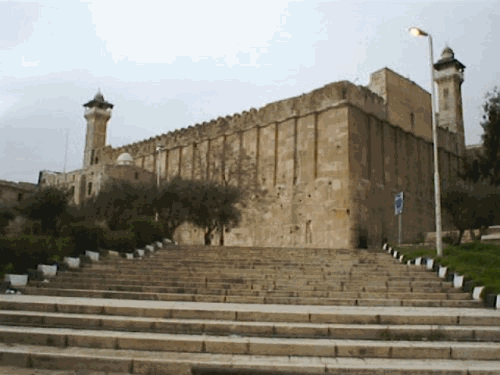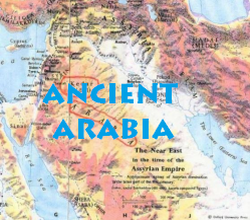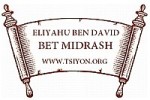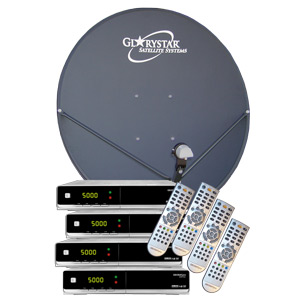 The Cave of Machpelah is the world's most
ancient Jewish site and the second holiest place for the Jewish people,
after Temple Mount in Jerusalem. The cave and the adjoining field were
purchased—at full market price—by Abraham some 3700 years ago.
Abraham,
Isaac,
Jacob,
Sarah,
Rebecca, and
Leah are all later buried in the same Cave of Machpelah. These are
considered the patriarchs and matriarchs of the Jewish people. The only
one who is missing is
Rachel, who was buried near
Bethlehem where she died in childbirth.
The Cave of Machpelah is the world's most
ancient Jewish site and the second holiest place for the Jewish people,
after Temple Mount in Jerusalem. The cave and the adjoining field were
purchased—at full market price—by Abraham some 3700 years ago.
Abraham,
Isaac,
Jacob,
Sarah,
Rebecca, and
Leah are all later buried in the same Cave of Machpelah. These are
considered the patriarchs and matriarchs of the Jewish people. The only
one who is missing is
Rachel, who was buried near
Bethlehem where she died in childbirth.
The double cave, a mystery of thousands of years, was
uncovered several years ago beneath the massive building, revealing
artifacts from the Early Israelite Period (some 30 centuries ago). The
structure was built during the
Second Temple Period (about two thousand years ago) by
Herod, King of Judea, providing a place for gatherings and Jewish
prayers at the graves of the Patriarchs.
This uniquely impressive building is the only one
that stands intact and still fulfills its original function after
thousands of years. Foreign conquerors and invaders used the site for
their own purposes, depending on their religious orientation: the
Byzantines and
Crusaders transformed it into a church and the
Muslims rendered it a mosque. About 700 years ago, the Muslim
Mamelukes conquered Hebron, declared the structure a mosque and
forbade entry to Jews, who were not allowed past the seventh step on a
staircase outside the building.
Upon the liberation of
Hebron in 1967, the Chief Rabbi of the
Israel Defense Forces, the late Major-General Rabbi Shlomo Goren,
was the first Jew to enter the Cave of Machpelah. Since then, Jews have
been struggling to regain their prayer rights at the site, still run by
the Muslim Waqf (Religious Trust) that took control during the Arab
conquest. Many restrictions are imposed on Jewish prayers and customs at
the Tomb of the Patriarchs despite the site's significance, primacy and
sanctity in Jewish heritage and history.
Over 300,000 people visit Ma'arat HaMachpelah
annually. The structure is divided into three rooms: Ohel Avraham, Ohel
Yitzhak, and Ohel Ya'akov. Presently Jews have no access to Ohel
Yitzhak, the largest room, with the exception of 10 days a year.
Need to talk to us? - In the USA and Canada just call us toll
free at (888) 230-2440 for help. Internationally, email us and we
will arrange a phone or Skype call for you.
From Eliyahu
Happy New Year! ..Time to
get ready for Passover!
The years have been speeding by as we move swiftly toward the end of
the age.
Now, another year has come. The Biblical New Year began at sundown
of March 13, 2013. That day in Biblical time can be expressed as
Month 1 (also called Abib or Aviv), Day (Yom)
1, 6013 TAM. "TAM" is an adaptation of another calandrical term,
"AM" which stands for Anno Mundi, which means "year of the
world." In other words, the year numbered from the creation of man.
TAM then means "Torah year of the world" - the new
year being year 6013 since the creation of Adam.
Realize that this is not the same as the (Rabbinical)
Jewish Year, which is acknowledged by Jewish scholars to have
shorted the actual time count by some 260 years. That means that
time is getting shorter than many think, though there still remains
just enough time for every word spoken through the prophets to be
fulfilled. Indeed, we watch many of these prophetic events unfolding
daily before our eyes.
Another difference between the (Rabbinical) Jewish Year and the
actual Biblical year is that the Jewish year begins in the fall.
However, the Bible calendar begins with this month of Abib, as YHWH
stated to Moses; "This month shall be the beginning of months for
you; it is to be the first month of the year to you." What month?
Exodus 14:4 names this first month as Abib. (Exodus 12:2,
14:4)
It seems very appropriate that Passover is the big event of this
first month. The latest Torah Midrash announced in this newsletter
airs on the 7th day of this 1st month, leaving just 6 full days
thereafter until Passover! That begins at sundown of March 26, on
the common calendar. Passover, of course, is the day YHWH freed
Israel from Egypt AND the day Messiah freed us from the
scourge of sin and death, by offering Himself as our Passover Lamb.
Our year - and our everything - must begin with an acknowledgment of
that most self-sacrificing of all events. As you make your
preparations for that special day, the hearts and prayers of all of
us here at Tsiyon are with you.
Shalom!
Eliyahu ben David
www.tsiyon.org
 Now Abraham gave all that he had to Isaac; but to the sons of his concubines, Abraham gave gifts while he was still living, and sent them away from his son Isaac eastward, to the land of the east.
Genesis 25:5+6
Now Abraham gave all that he had to Isaac; but to the sons of his concubines, Abraham gave gifts while he was still living, and sent them away from his son Isaac eastward, to the land of the east.
Genesis 25:5+6







 Tsiyon
Road is now on Glorystar Satellite! -
We are happy to
announce that Tsiyon Road is now being broadcast 24/7/365
from Galaxy 19, available through Glorystar Satellite. Glorystar
is a family-friendly alternative to Direct TV
and Dish TV. A major difference is - there are no monthly
subscription payments! We will be sharing more about our new
Glorystar affiliation soon, including special deals on
Glorystar Satellite for our listeners, but for now we
would just like to say that we are delighted that Glorystar
will be making Tsiyon Road available to millions of people
living virtually anywhere in North America, with the Caribbean and
some of South America also in reach.
Tsiyon
Road is now on Glorystar Satellite! -
We are happy to
announce that Tsiyon Road is now being broadcast 24/7/365
from Galaxy 19, available through Glorystar Satellite. Glorystar
is a family-friendly alternative to Direct TV
and Dish TV. A major difference is - there are no monthly
subscription payments! We will be sharing more about our new
Glorystar affiliation soon, including special deals on
Glorystar Satellite for our listeners, but for now we
would just like to say that we are delighted that Glorystar
will be making Tsiyon Road available to millions of people
living virtually anywhere in North America, with the Caribbean and
some of South America also in reach.  The Cave of Machpelah is the world's most
ancient Jewish site and the second holiest place for the Jewish people,
after Temple Mount in Jerusalem. The cave and the adjoining field were
purchased—at full market price—by Abraham some 3700 years ago.
Abraham,
Isaac,
Jacob,
Sarah,
Rebecca, and
Leah are all later buried in the same Cave of Machpelah. These are
considered the patriarchs and matriarchs of the Jewish people. The only
one who is missing is
Rachel, who was buried near
Bethlehem where she died in childbirth.
The Cave of Machpelah is the world's most
ancient Jewish site and the second holiest place for the Jewish people,
after Temple Mount in Jerusalem. The cave and the adjoining field were
purchased—at full market price—by Abraham some 3700 years ago.
Abraham,
Isaac,
Jacob,
Sarah,
Rebecca, and
Leah are all later buried in the same Cave of Machpelah. These are
considered the patriarchs and matriarchs of the Jewish people. The only
one who is missing is
Rachel, who was buried near
Bethlehem where she died in childbirth.